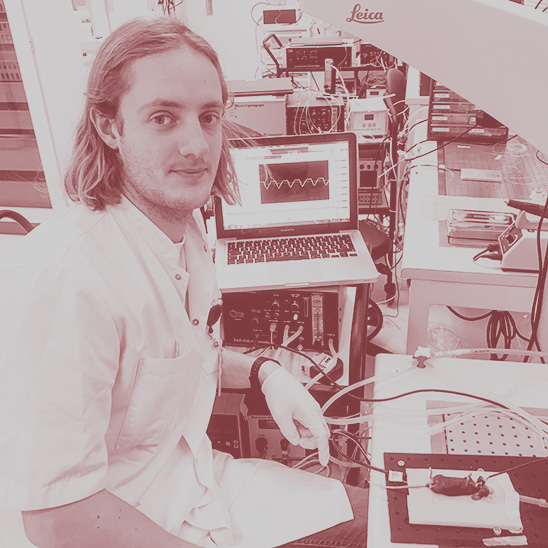Sex: The hidden variable
SDC PhD student Thomas Beck Lindhardt examined physiological and behavioural responses in male and female mice for awake MRI habituation.Read more
The selection of Life Sciences as a research theme within the framework at SDC is based on Danish-Chinese positions of strength and a common interest in investing and supporting research within the area. Life Sciences deals with two major subthemes, 1) Neuroscience and Cognition and 2) Omics.
Neuroscience and Cognition
The collaboration research collaboration between Denmark and China aims to combine Chinese and Danish scientific strongholds within neuroscience, cognition and technology.
Neuroscience is a traditional stronghold in Danish research. During the last decade, funnelled by rapid progress in scanning technologies, image processing and mathematical modelling, the use of neuroimaging techniques to study the human mind has grown dramatically. The physiological underpinnings of this development were originally discovered by Danish research groups in the 1970s. However, the introduction of functional brain imaging has expanded on the applicability and scope of such investigations. This has created a need for a new organisation of multidisciplinary research work and ‐culture and a strong sense of a common research identity in spite of differences in training.
Over the last 20 years, the Chinese Government has invested heavily in all areas of basic neuroscience as part of a major drive for excellence. New research institutions with state-of-the-art facilities and equipment have been established and elite Chinese and foreign scientists have been recruited back to China to participate in pushing future development.

Omics
Omics is a common term for a number of large scale analytical techniques for global assessment of the state of biological material. It can be subdivided in genomics, proteomics, glycomics, lipidomics and metabolomics.
Omics approaches are becoming increasingly important for biochemistry research and production such as the pharmaceutical and food industries. The approach first and foremost seeks to describe the full situation in a given biological system and therefore yields results that are not obtainable with traditional reductionist methods within the field of biochemistry or molecular biology.
Denmark has a strong research tradition within several omics disciplines. Research groups in glycomics, lipidomics and membrane biophysics are present at the University of Southern Denmark, and a center for metabolomics has been established at the Copenhagen University. Danish scientists within proteomics and have been pioneers in developing mass spectrometry based proteomics. Proteomics is now an important activity in most Danish Universities and all the activities are linked in a strong national network that also includes major Danish biotech and pharma companies, some of which have important activities in China.
Since the turn of the century the Chinese government has invested forcefully in establishing advanced research environments and now has state-of-the-art facilities, laboratories and equipment, as well as some of the most accomplished scientists in the world. The progression has been rapid, and in some fields, for instance genomics, the competences and equipment of the Chinese institutes are unmatched.
PhD students
SDC PhD students play an important role in the research collaboration. They all work with both a Danish and a Chinese supervisor, do research in both countries and contribute to teaching the Master’s programmes at SDC in Beijing. This close connection provides the PhD students with a unique opportunity to establish personal and professional relationships and bring Danish and Chinese research environments closer together.



Kim Ryun Drasbek
Associate professor
Department of Clinical Medicine
Aarhus University
E-mail: ryun@cfin.au.dk
To discuss proposals for research activities, which can strengthen SDC's activities within the research area or the related Master’s programmes, please contact the Principal Coordinators.
Ding Wenjun
Professor and Executive Dean
College of Life Sciences
University of Chinese Academy of Sciences
E-mail: dingwj@ucas.ac.cn
Kata Molnar
Department of Clinical Medicine, Aarhus University
Topic: Cellular and molecular characterization of brain tumor networks
Starting date: 1 November 2024
Alkistis Gavriilidou
Department of Nutrition, Exercise and Sports, University of Copenhagen
Topic: Theta Dynamics as a signature of movement initiation; Bridging Mechanisms, Applications and Clinical Implications
Starting date: 15 October 2024
Anja Damgaard
Department of Health Technology and Science, Aalborg University
Topic: Predictive biomarkers for improving prognostics and diagnostics of autoimmune disorders – a key focus on pathologies with renal dysfunction
Starting date: 1 October 2024
Caroline Vangsøe
Center of Functionally Integrative Neuroscience, Aarhus University
Topic: The Cytoprotective Effective of Conditioned Extracellular Vesicles in Stroke
Starting date: 1 December 2023
Bianka Rumi
DTU Compute, Technical University of Denmark
Topic: Investigating brain networks affected by TMS approaches in psychiatric disorders
Starting date: 1 November 2023
Magnus Tudsborg Frantzen
Department of Chemistry and Bioscience at Aalborg University
Topic: Molecular mechanism of calcium dyshomeostasis in dopaminergic neurons
Starting date: 1 December 2022
Camilla Termansen Erichsen
Department of Clinical Medicine at Aarhus University
Topic: Mechanisms behind cognitive symptoms in schizophrenia and depression
Starting date: 1 November 2022
Lara Marziani
Center of Functionally Integrative Neuroscience, Aarhus University
Topic: Effect of remote ischemic conditioning (RIC) miRNAs in stroke models
Starting date: 1 November 2022
Irene Delgado Alonso
Department of Chemistry and Bioscience at Aalborg University
Topic: Development of antibodies as tools for combating viral infections and beyond
Starting date: 1 October 2022
Ole Borup Svendsen
Department of Clinical Medicine, Aarhus University
Topic: The microstructural organization of OFC top-down connectivity and its functional association to OCD
Starting date: 1 September 2021
Jannik Nicklas Eliasen
Department of Drug Design and Pharmacology, University of Copenhagen
Topic: Explore neuronal activity of psychedelics which underlie the therapeutic effects in mental disorders.
Starting date: 31 December 2020
Jacob Skallerup Andersen
Department of Health Science and Technology, Aalborg University
Topic: Personalized Medicine in Rheumatic Autoimmune Diseases
Starting date: 1 December 2020
Rasmus West Knopper
Department for Clinical Medicine, Aarhus University
Topic: Locus coeruleus: The master switch for brain health?
Starting date: 1 December 2020
Luciano de Oliveira Souza
Department Of Drug Design and Pharmacology, University of Copenhagen
Topic: Identification of a predictive omics signature for taxane resistance in prostate cancer
Starting date: 31 December 2019
Jefferson Novaes Gomes
Department of Drug Design and Pharmacology, the University of Copenhagen
Topic: Opioids and the Mesopontine Cholinergic Nuclei: Explorations of a new target for combating opioid addiction.
Starting date: 1 December 2019